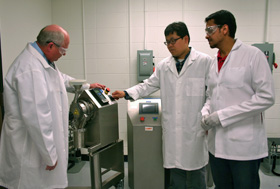UM offers new course in pharmaceutical tablet technology

Michael A. Repka (left) with students in the tableting lab
ome 30 to 60 nontraditional students are expected to gather at the University of Mississippi in September for a weeklong course that will teach them how to make and evaluate tablets used to deliver medicines or dietary supplements.
Mostly from the pharmaceutical industry and the agency that regulates it (U.S. Food and Drug Administration), the students are coming from across the country and elsewhere to take UM's new "Hands-on Course in Tablet Technology," which will be offered three times a year and bring 100 to 200 pharmaceutical scientists to the Oxford campus.
"Participants will learn how to choose the right components to make tablets, work in teams to actually make them, then evaluate or test them to ensure that they are appropriate," said Michael A. Repka, the School of Pharmacy's professor and chair of pharmaceutics and director of its Pii Center for Pharmaceutical Technology.
The Sept. 22-27 course's daily lectures and laboratories will be taught by a broad mix of representatives from industry, equipment manufacturers and academia to ensure that participants receive a broad overview of the science and technology associated with developing and manufacturing tablets using advanced manufacturing processes such as hot-melt extrusion.
Because the course emphasizes industrial applications, lectures are designed to enable participants to explore the concepts of tablet design, process validation, product evaluation and FDA guidelines for product development, manufacturing and expiration dating. The course's extensive laboratory exercises are designed to give participants lots of hands-on experience with various aspects of production from start to finish, and on the most advanced equipment.
"The beauty of this course is that we get to teach development, production and quality-control functions to people who may have limited knowledge about them," Repka said. "It is a very unique and comprehensive basic course that has been successful due to its appeal to a diverse group of people."
The course was founded 15 years ago at the University of Tennessee's School of Pharmacy by James R. Johnson and the late Atul Shukla, "two pioneers in promoting and fostering continuing education in pharmaceutical technology," Repka said.
"The course quickly became well-known in industry, government and academia, and drew participants from around the globe," he said. "In fact, it was not uncommon for applicants to be turned down, despite the course being offered three to four times per year."
Under the direction of Repka, Johnson and Eddie L. Brunson, the course coordinator at UT, the course has moved to Ole Miss to take advantage of the School of Pharmacy's reputation as a leader in the education of pharmaceutical scientists, its pharmaceutics faculty's expertise and the willingness of equipment vendors to supplement existing state-of-the-art laboratory equipment with the latest analytical testing and manufacturing equipment, said Walt Chambliss, director of technology management at UM, who is also a pharmaceutics professor and member of the tableting course's teaching team.
"The course is a strong fit with the pharmacy school's strategic goals of being a leader in pharmaceutical education and in transferring technologies to companies for commercial development," Chambliss said. "It also complements programs in the school and the university's Office of Research and Sponsored Programs to enhance collaborations between our researchers and pharmaceutical scientists in industry who can serve as developmental partners for technologies discovered in the school."
The Sept. 22-27 course includes a reception and orientation session from 6 to 7:30 p.m. Sunday. The course ends at noon Friday.
The fee for the course is $3,000 and includes tuition, lab coats and supplies, daily refreshments, lunch and reception. Registration forms, as well as more information about the course (syllabus, special accommodations, hotel reservations, airport shuttle, etc.), are available at http://www.outreach.olemiss.edu/tablettech or www.tabcourse.com. Completed forms should be sent to course coordinator and registrar Barbara Thompson at bthompso@olemiss.edu.
| 
